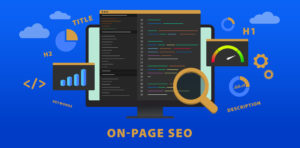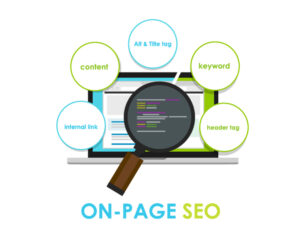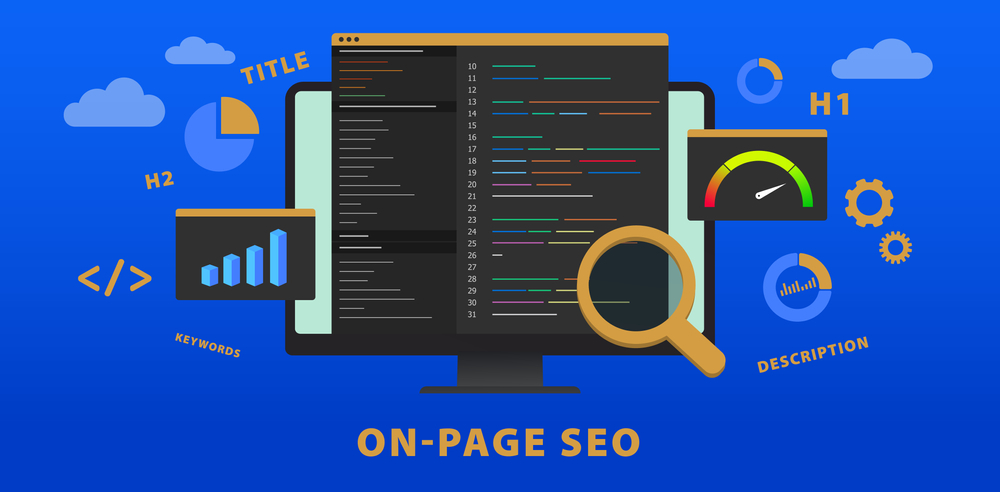Introduction:
In the ever-evolving landscape of digital marketing, Search Engine Optimization (SEO) continues to play a pivotal role in determining the success of websites. One crucial aspect of SEO is On-Page SEO, which refers to the optimization of individual web pages to rank higher and earn more relevant traffic in search engines. In this blog, we’ll delve into the fundamentals of On-Page SEO, its importance in website ranking, effective strategies, common mistakes to avoid, and how it influences search engine rankings and user experience in 2024.

What is On-Page SEO?
On-Page SEO plays a crucial role in determining a website’s search engine rankings and attracting organic traffic. However, some common pitfalls can hinder its effectiveness and lead to negative consequences for a website’s visibility and user experience. One such pitfall is the use of copied or duplicate content, which can result in penalties from search engines and undermine the credibility of a website. Similarly, keyword stuffing, or the excessive use of keywords in an attempt to manipulate search rankings, can backfire and result in a poor user experience. Additionally, neglecting technical aspects such as page load speed, mobile responsiveness, and broken links can hamper a website’s performance and frustrate visitors, leading to high bounce rates and low engagement metrics.
To avoid these pitfalls, it’s essential to prioritize creating original, high-quality content that provides value to users and addresses their search intent. Conducting thorough keyword research and incorporating relevant keywords naturally into content can improve search visibility without sacrificing readability or user experience. Furthermore, optimizing technical aspects such as meta tags, URL structure, and internal linking can enhance crawlability and indexability, making it easier for search engines to understand and rank your website’s content. By focusing on these key aspects of On-Page SEO and avoiding common pitfalls, website owners can improve their chances of ranking higher in search results and attracting qualified organic traffic.
Importance of On-Page SEO in Website Ranking:

On-Page SEO is vital for website ranking as it directly impacts search engine rankings and user experience. By optimizing on-page elements, websites can improve their visibility in search engine results pages (SERPs), attract more organic traffic, and ultimately increase conversions and revenue.
-
Keyword Optimization:
– Keyword optimization involves strategically incorporating relevant keywords throughout your website’s content, including titles, headings, meta descriptions, and body text. For example, if you’re a fitness blogger writing about healthy recipes, you’ll want to include keywords like “healthy recipes,” “nutritious meals,” and “clean eating” in your content to improve visibility for relevant searches.
-
Quality Content:
– Quality content is crucial for engaging users and satisfying their search intent. It should be informative, engaging, and valuable to your target audience. For instance, if you run a travel website, publishing in-depth guides, travel tips, and personal experiences can attract and retain visitors interested in exploring new destinations.
-
Meta Tags Optimization:
– Meta tags, including title tags and meta descriptions, provide search engines and users with a preview of your webpage’s content. Optimizing these tags involves crafting compelling titles and descriptions that accurately reflect your content and encourage users to click through. For example, a well-optimized meta description for a gardening blog post might highlight specific tips or benefits, such as “Discover expert gardening advice for growing vibrant flowers and lush vegetables in any climate.”
-
URL Structure:
– A clear and concise URL structure enhances both user experience and search engine crawlability. By incorporating relevant keywords and organizing URLs logically, you make it easier for users and search engines to understand the content of your pages. For instance, a URL like “example.com/healthy-recipes/easy-chicken-salad” provides clear information about the page’s topic and content.
-
Header Tags:
– Header tags (H1, H2, H3, etc.) help structure your content and break it into digestible sections. Properly utilizing header tags improves readability and signals the importance of different sections to search engines. For instance, using an H1 tag for the main title of your blog post and H2 tags for subheadings helps organize content and improves SEO.
-
Image Optimization:
– Image optimization involves optimizing images for faster loading times, improved accessibility, and enhanced SEO. This includes using descriptive filenames, adding alt text to describe the image’s content, and providing captions when necessary. For example, an image of a healthy smoothie recipe should have a filename like “healthy-smoothie-recipe.jpg” and alt text describing the ingredients and preparation process.
-
Internal Linking:
– Internal linking involves linking to other pages within your website to guide users to related content and improve website navigation. Strategic internal linking helps spread link equity throughout your site, improves crawlability, and enhances user experience. For example, a blog post about gardening tips could include internal links to relevant articles on soil preparation, plant care, and pest control.
-
Mobile Optimization:
– With the increasing use of mobile devices for internet browsing, optimizing your website for mobile is essential for providing a seamless user experience. This includes using responsive design, optimizing page speed, and ensuring buttons and text are easily clickable and readable on smaller screens. Mobile optimization improves user engagement and boosts your site’s visibility in mobile search results.
-
Page Speed Optimization:
– Page speed optimization focuses on improving the loading speed of your webpages to enhance user experience and SEO performance. This includes optimizing images, minifying CSS and JavaScript files, and leveraging browser caching. Faster loading times reduce bounce rates, improve conversion rates, and signal to search engines that your site provides a positive user experience.
-
Schema Markup:
– Schema markup is a structured data vocabulary that helps search engines understand the content of your webpages better. By implementing schema markup, you can enhance your search listings with rich snippets, such as star ratings, reviews, and product information, which can increase click-through rates and visibility in SERPs. For example, a recipe website can use schema markup to display cooking times, calorie counts, and ingredient lists directly in search results, making their listings more informative and appealing to users.
Strategy for On-Page SEO:
While all on-page elements are important, focusing on keyword optimization, quality content creation, and technical aspects like page speed optimization can yield significant results in improving website ranking and user experience.
- Semantic Markup: Utilizing structured data markup such as schema.org to provide search engines with additional context about the content on your website, improving the likelihood of rich snippets appearing in search results.
- Dynamic Content Optimization: Implementing techniques to dynamically optimize content based on user behavior, demographics, or other factors to enhance relevance and engagement.
- Advanced Internal Linking Strategies: Employing sophisticated internal linking strategies, including siloing and hub-and-spoke models, to distribute link equity effectively and guide users to relevant content.
- Natural Language Processing (NLP) Integration: Leveraging NLP technology to analyze user queries and optimize content for conversational search queries, voice search, and natural language understanding.
- Machine Learning-Driven Optimization: Using machine learning algorithms to analyze large datasets and identify patterns in user behavior, content performance, and search engine ranking factors, enabling data-driven decision-making and continuous optimization efforts.
Common Mistakes in On-Page SEO:
Some common mistakes to avoid in On-Page SEO include keyword stuffing, duplicate content, neglecting mobile optimization, ignoring meta tags, and neglecting to update and refresh content regularly.
On-Page SEO Techniques:
On-Page SEO techniques employ a comprehensive strategy, integrating keyword research, content optimization, technical enhancements, and ongoing monitoring to ensure peak performance and visibility in search engine rankings. Moreover, in 2024, user engagement and the relevance of content play pivotal roles in determining search visibility. Therefore, crafting engaging titles and meta descriptions that directly address user queries is paramount for increasing click-through rates (CTR). This strategic optimization is vital within SEO strategies, as it not only impacts search engine rankings but also significantly influences the overall user experience, fostering enhanced engagement and satisfaction.
How Websites Are Missing These Points in Their SEO Strategies:
Many websites overlook the importance of On-Page SEO or fail to implement best practices effectively. This can result in lower search engine rankings, decreased organic traffic, and missed opportunities for growth and success.
Mistakes to Avoid in On-Page SEO:
To maximize the effectiveness of On-Page SEO, it’s essential to avoid common mistakes such as keyword stuffing, neglecting mobile optimization, ignoring meta tags, and failing to update and refresh content regularly.
All Sums Up
In conclusion, On-Page SEO is a critical component of any successful SEO strategy, as it directly influences search engine rankings and user experience. By implementing effective On-Page SEO techniques and avoiding common mistakes, websites can improve their visibility, attract more organic traffic, and ultimately achieve their business goals in 2024 and beyond.
Optimizing Your Online Presence with Zonvoir Technologies
At Zonvoir Technologies, we take pride in our ability to elevate our clients’ website rankings through strategic and tailored On-Page SEO techniques. Unlike one-size-fits-all approaches, we understand that each niche requires a custom strategy to succeed. Our team of experts collaborates globally, ensuring that we have access to diverse expertise and perspectives. Whether it’s search engine optimization, web development, or web design, we offer outsourcing and hourly-based services to provide cost-effective solutions. Partner with us to experience the difference our customized strategies and global expertise can make in optimizing your online presence.





Leave a Reply